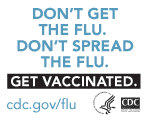CDC Features
Preventing Infections During Pregnancy

Simple steps can help keep your unborn baby safe.

These 10 tips can help you prevent infections that could harm your unborn baby. You won’t always know if you have an infection—sometimes you won’t even feel sick. If you think you might have an infection or think you are at risk, see your doctor. (One page, printable versions of these tips are available in English ![]() , 42KB, 1 page, and Spanish,
, 42KB, 1 page, and Spanish, ![]() , 38KB, 1 page).
, 38KB, 1 page).
1. Wash your hands often with soap and water, especially when…
• Using the bathroom
• Touching raw meat, raw eggs, or unwashed vegetables
• Preparing food and eating
• Gardening or touching dirt or soil
• Handling pets
• Being around people who are sick
• Getting saliva (spit) on your hands
• Caring for and playing with children
• Changing diapers
If soap and running water are not available, you may use alcohol-based hand gel. Click here to learn more about this tip.

2. Try not to share forks, cups, or food with young children. Wash your hands often when around children. Their saliva and urine might contain a virus. It is likely harmless to them, but it can be dangerous for you and your unborn baby. Click here to learn more about this tip.
3. Cook your meat until it’s well done. The juices should run clear and there should be no pink inside. Do not eat hot dogs, luncheon meats, or deli meats, unless they are reheated until steaming hot. These undercooked meats and processed meats might contain harmful bacteria. Click here to learn more about this tip.

4. Avoid unpasteurized (raw) milk and foods made from it. Do not eat soft cheeses such as feta, brie, and queso fresco unless they have labels that say they are pasteurized. Unpasteurized products can contain harmful bacteria. Click here to learn more about this tip.

5. Do not touch or change dirty cat litter. Have someone else do it. If you must change the litter yourself, be sure to wear gloves and wash your hands afterwards. Dirty cat litter might contain a harmful parasite. Click here to learn more about this tip.

6. Stay away from wild or pet rodents and their droppings. Have a pest control professional get rid of pests in or around your home. If you have a pet rodent, like a hamster or guinea pig, have someone else care for it until after your baby arrives. Some rodents might carry a harmful virus. Click here to learn more about this tip.
7. Get tested for sexually transmitted diseases (STDs), such as HIV and hepatitis B, and protect yourself from them. Some people who have HIV, Hepatitis B, or an STD do not feel sick. Knowing whether you have one of these diseases is important. If you do, talk to your doctor about how you can reduce the chance that your baby will become sick. Click here to learn more about this tip.

8. Talk to your doctor about vaccinations (shots). Some are recommended before you become pregnant, during pregnancy, or right after delivery. Having the right vaccinations at the right time can help keep you healthy and help keep your baby from getting very sick or having life-long health problems. Click here to learn more about this tip.
9. Avoid people who have an infection. Stay away from people who you know have infections, such as chickenpox or rubella, if you have not yet had it yourself or did not have the vaccine before pregnancy. Click here to learn more about this tip.

10. Ask your doctor about group B strep. About 1 in 4 women carry this type of bacteria, but do not feel sick. An easy swab test near the end of pregnancy will show if you have this type of bacteria. If you do have group B strep, talk to your doctor about how to protect your baby during labor. Click here to learn more about this tip.
This is not a complete guide to a healthy pregnancy. Be sure to talk with your doctor to learn more about safe food preparation, wearing insect repellent when outside, taking medicine, and other important topics.
More Information and Resources
CDC Pregnancy Information
If you’re pregnant or planning to become pregnant, you probably have a lot of questions. This website is designed to help you learn how to give your baby a healthy start to life.
Clean Hands Campaign
Keeping hands clean is one of the most important steps we can take to avoid getting sick and spreading germs to others.
Ounce of Prevention Campaign
This campaign arms health educators and consumers with information as well as practical and useful tips on preventing infectious diseases.
Folic Acid Awareness
Additional article in the series on preventing birth defects.
Ten Tips to Prevent Infections During Pregnancy ![]() podcast, 4 minutes
podcast, 4 minutes
Know someone who is thinking about getting pregnant?
Send her this Health-e-Card from CDC
Know someone who is pregnant?
Send her this Health-e-Card from CDC
Know someone who just had a baby?
Send her this Health-e-Card from CDC
Page last updated: January 14, 2008
Content source: National Center on Birth Defects and Developmental Disabilities
National Center for HIV/AIDS, Viral Hepatitis, STD and TB Prevention
National Center for Immunization and Respiratory Diseases
Content owner: National Center for Health Marketing
URL for this page: www.cdc.gov/Features/Pregnancy






